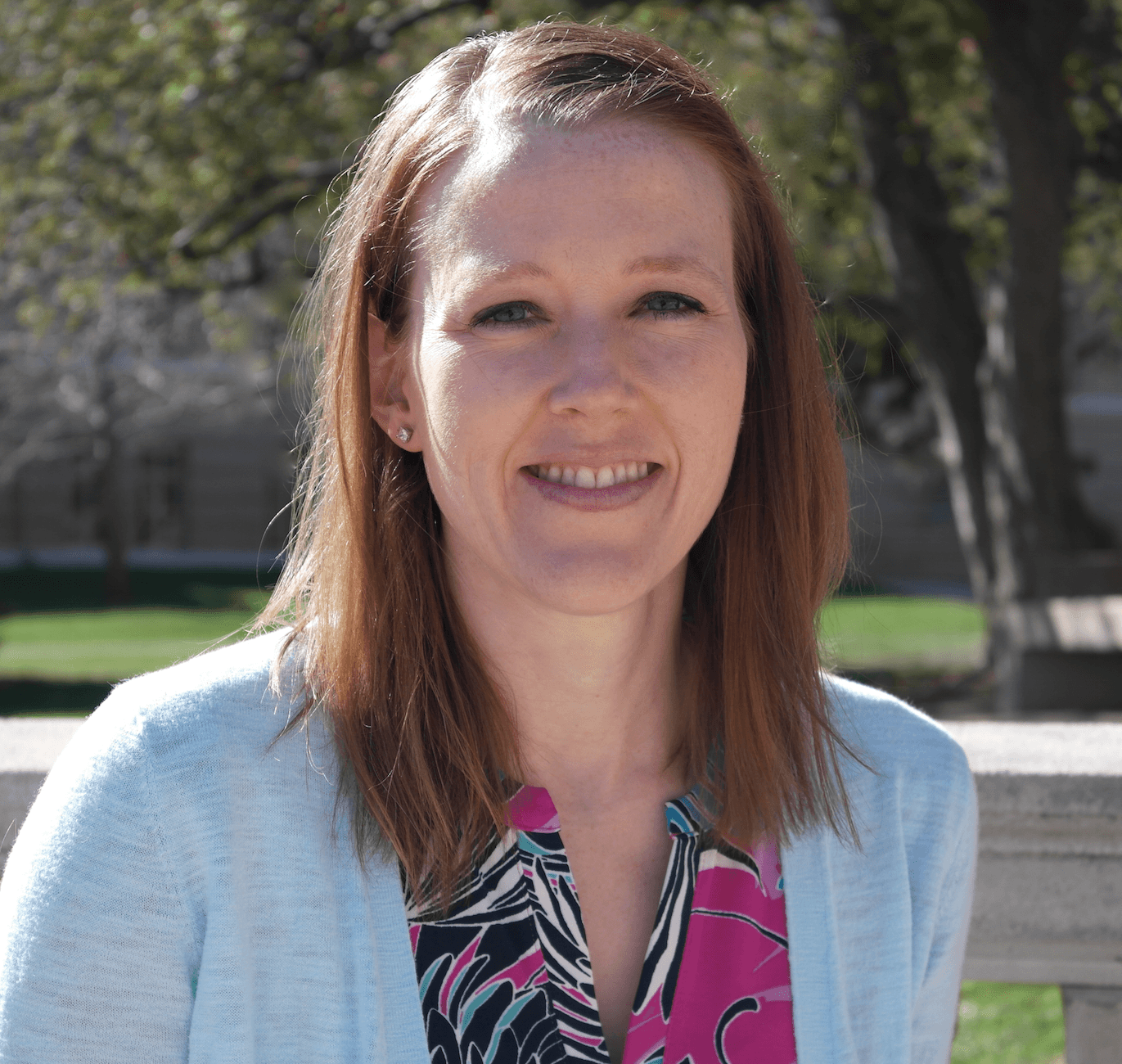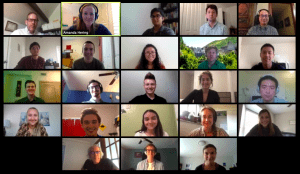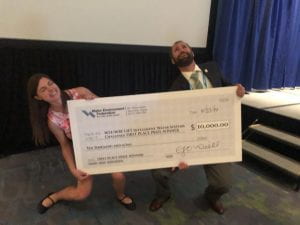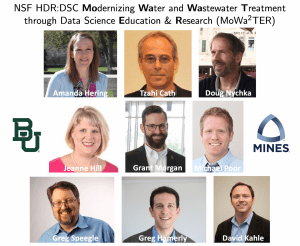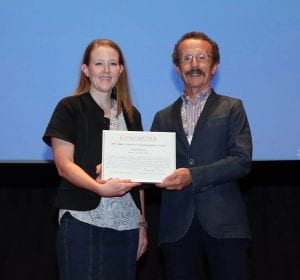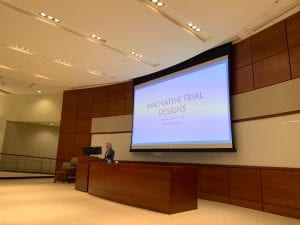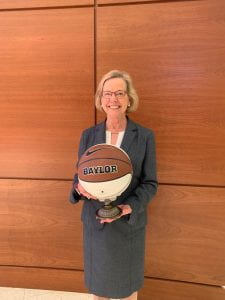Thanks to the Department of Statistics at Texas A&M University’s Statistics Former Student Network (SFSN) for the invitation to give a virtual talk to the department and statistical community. For those unfamiliar with the SFSN, they host 2-3 talks per semester and post the recorded talk on their website here. Here is a link to my talk given on April 21, 2024 and posted on YouTube. In it, I review some of the work that my collaborators, students, and I have worked on over the past ten years in the area of monitoring in water and wastewater treatment systems. See if you can find the “squirrel” in the talk. 🙂
Book in Statistical Process Monitoring Published
With coauthors Fouzi Harrou, Ying Sun, Muddu Madakyaru, and Abdelkader Dairi, Elsevier has published our book, Statistical Process Monitoring Using Advanced Data-Driven and Deep Learning Approaches. This book tackles multivariate challenges in process monitoring by merging the advantages of univariate and traditional multivariate techniques to enhance their performance and widen their practical applicability. The book proceeds with merging the desirable properties of shallow learning approaches – such as a one-class support vector machine and k-nearest neighbours and unsupervised deep learning approaches – to develop more sophisticated and efficient monitoring techniques. Many real-world applications are given in waste-water treatment plants, detection of obstacles in driving environments for autonomous robots and vehicles, robot swarm, chemical processes (continuous stirred tank reactor, plug flow rector, and distillation columns), ozone pollution, road traffic congestion, and solar photovoltaic systems. The book is available for purchase here.
2020 Data Science Fellows
The first 2020 cohort of the NSF-funded Data Science Fellows program is complete! Aqua-Aerobic Systems, Ramey Environmental, Denver Water, National Renewable Energy Lab, Superior Wastewater, and Bureau of Reclamation all contributed large datasets and an associated problem statement. Teams of three students each worked to solve one of these problems. Undergraduate students from Colorado School of Mines, Baylor University, and McLennan Community College participated. During the course of the fully online program, students gave weekly presentations of their work, met and discussed their work with stakeholders, participated in a code review/exchange, and learned new statistical methods to apply to their problem. Each team developed a code and data repository, wrote a 4-page technical brief, and delivered a final 20-minute presentation. This picture of our final Zoom meeting shows all of the faculty, graduate TAs, and undergraduate participants.
Inaugural Cohort of Introduction to Data Science Class
This spring 2020 is the first Introduction to Data Science class, being held in the Active Learning Lab of Moody Library and also being concurrently taught at Colorado School of Mines. The class is being team taught by a group of five faculty that includes both statisticians and computer scientists. This prerequisite-free class is designed to introduce students to principles of data science through the R programming language and real, hands-on datasets. It is part of the National Science Foundation funded Data Science Corps Award, titled Modernizing Water and Wastewater Treatment through Data Science Education and Research (MoWaTER). The class precedes a five-week summer internship program. More details can be found on the MoWaTER webpage: www.baylor.edu/mowater
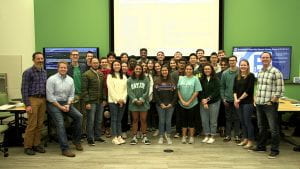
National Alliance for Water Innovation wins $100 million DOE Water-Energy Hub
Baylor University has partnered with four Department of Energy laboratories and more than a dozen universities in a research alliance to address the nation’s water security issues through desalination and will share in a $100 million grant funding the project for five years. The National Alliance for Water Innovation (NAWI) is a public-private partnership headquartered at Berkeley Lab and includes Oak Ridge National Laboratory, the National Renewable Energy Laboratory, 19 founding university partners—including Baylor University—and 10 founding industry partners.
NAWI’s goal is to enable the manufacturing of energy-efficient desalination technologies in the United States at a lower cost with the same (or higher) quality and reduced environmental impact for 90 percent of non-traditional water sources within the next 10 years. As a DOE innovation hub, NAWI will conduct research and also develop a road map to prioritize the highest impact technology options, then identify and solicit projects to support those priorities.
Amanda S. Hering is the site director of the Baylor team. She does research in the area of statistics as applied to environmental and engineering problems related to water. Her connection to NAWI began more than two years ago based on her work in data-driven automation of decentralized wastewater treatment facilities with her environmental engineering colleagues at Colorado School of Mines. She is pictured below with graduate students during a visit to Oak Ridge National Laboratory for the NextGen planning workshop in preparation for the DOE proposal.
Team Wins 2019 Intelligent Water Systems Challenge
The goal of the Intelligent Water Systems Challenge is to demonstrate the value of intelligent water systems to utilities and to foster adoption of smart water technologies, as well as give students, professionals, and technology experts the opportunity to showcase their talents and innovation with a focus on leveraging data using the tools to help utilities make better decisions. Our team was comprised of Chris Marks (Boulder Water Resource Recovery Facility); Kate Newhart (Colorado School of Mines PhD Student); Tanja Rauch-Williams (Carollo Engineers); Tzahi Cath (Colorado School of Mines); and Amanda Hering (Baylor University). We developed a statistical model to forecast ammonia in the aeration basin to inform model predictive control of aeration. This improved system has the potential to reduce over-aeration and energy consumption. Chris and Kate (pictured below) were invited to present the team’s work at WEFTEC where they were chosen as winners of the challenge, receiving $10,000 and a giant check!
Baylor and Mines Team Awarded NSF Data Science Corps
A multidisciplinary team of statisticians, computer scientists, and environmental engineers, led by Associate Professor Amanda Hering of Baylor University, has received a $1.157 million award from the National Science Foundation. Joint with Colorado School of Mines, a novel, introductory data science course and undergraduate summer research program will be designed to motivate students early in their academic studies to pursue careers in data science by connecting them with authentic projects and stakeholders. The data-rich industry of water and wastewater treatment (W/WWT) will provide an extensive portfolio of tractable projects. Although data are easy to collect and abundant in the W/WWT industry, methods of monitoring, maintenance, and sensor calibration lag behind the state-of-the-art. This project will produce the next generation of data scientists who are ready to fill “mid-level” data science positions and will help W/WWT facility operators reduce costs and improve water quality by utilizing the information in their data.
Abdel El-Shaawari Early Investigator Award
Dr. Hering was selected by The International Environmetrics Society (TIES) to receive the Abel El-Shaawari Early Investigator Award. Abel El-Shaawari is one of the founders of TIES and was its first president until 2000. The award was established in his honor to recognize statisticians in early career stages for having made outstanding contributions to the field of environmetrics. Dr. Hering was invited to the World Statistics Congress, held August 18-23, 2019 in Kuala Lumpur, Malaysia, to give a lecture and receive the award. She was commended as follows: “For significant and outstanding contributions to the environmental statistical and quantitative research as proved by the number and quality of publications in the statistical literature. She has strong interdisciplinary connections with other scientific communities, especially with respect to important environmental problems. She is also the recipient of highly-rated, externally-funded research projects. She has had long-term involvement with the Environmetrics community, together with being an Associate Editor for the Environmetrics journal.”
Lisa LaVange Gives Tom Bratcher Memorial Lectures
Lisa LaVange, PhD, is an elected fellow of the American Statistical Association (ASA) and was the 2018 ASA President. She is also Distinguished Professor and Associate Chair of the Department of Biostatistics in the Gillings School of Global Public Health at the University of North Carolina at Chapel Hill. In her role as associate chair, she coordinates development of the data science curriculum for the Gillings School. She is also director of the department’s Collaborative Studies Coordinating Center (CSCC), overseeing faculty, staff, and students involved in large-scale clinical trials and epidemiological studies coordinated by the center. Currently, she is Coordinating Center Principal Investigator (PI) for the NICHD-sponsored Adolescent Medicine Trials in HIV/AIDS Interventions Network and of the NHLBI-sponsored Precision Medicine Interventions in Severe and/or Exacerbation Prone Asthma Network (PrecISE).
On April 11-12, 2019, Prof. LaVange visited Baylor, giving two talks. One talk was a university-wide talk titled “Opportunities and Challenges in Clinical Research with the Use of Big Data and Novel Trial Designs.” A second talk, primarily for the Department of Statistical Science, was “Reflections on Statistical Practice, Leadership, and Training.” Prof. LaVange mentored senior female faculty and statisticians during her visit and received a basketball signed by Baylor women’s basketball head coach and recent national championship winner Kim Mulkey.
Illuminate Campaign Launch
On November 1, 2018, Baylor University launched its university fundraising campaign, Give Light. As part of the kick-off, a walking-supper event was hosted where nine university faculty were invited to share their research with over 600 Baylor faculty, donors, and alumni. My team was honored to be one of the groups selected, giving us many opportunities to demonstrate the importance of statistics in data science and our world today. We used interactive activities and a 3-D model of a decentralized wastewater treatment facility to explain how we use high-dimensional and high-frequency data to detect and diagnose faults in a physical-biological-chemical wastewater treatment system. If such systems can become autonomous, then local water reuse can be part of the solution to water scarcity in water-stressed communities. Special thanks go to our collaborators at Colorado School of Mines and the National Science Foundation for their support of this project. Statistics Ph.D. student Molly Klanderman and computer science M.S. student Mikhail Shmurygin were both on hand to answer questions during the event, and we even got to meet Baylor President Linda Livingstone! Sic ’em, Bears!
